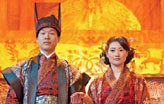Op-Ed Contributors
Tsinghua's foreign academic connection
Updated: 2011-04-16 07:35
By Li Yuhong and Yin Qi (China Daily)
Tsinghua University, one of China's most renowned universities, will celebrate its 100th year later this month. During its 100-year history, the university has shaped the lives of many people who have made great contributions to China in different fields.
The more than 10,000 foreign teachers and visiting fellows have played a very important role in the university's 100 years' of development. In more ways than one, Tsinghua reflects the development of higher education in China.
Tsinghua, which started as a preparatory school for Chinese students going to study abroad, especially in the United States, has today developed into a comprehensive, research-based university. It entered a new period - of boom - after the reform and opening-up was introduced in the late 1970s.
The central government views the recruitment of foreign experts as a long-term strategy, and that has deepened educational reform. Over the past three decades, Tsinghua University has introduced modern methods, followed leading global academic trends and employed excellent foreign educational resources. More than 100 of the over 10,000 experts that have served Tsinghua are winners of the Nobel Prize, Turing Award and the Fields Medal.
Tsinghua has covered more academic areas and invited more experts in science and arts streams in the past 30 years. And about 50 percent of the foreign experts today are in the university's science and technology departments, 43 percent in arts, and 7 percent in law and medical science.
In the past decade, Tsinghua has made its concept of building an international faculty clearer through a series of reforms for the cultivation of talents. Guided by the country's education policy and funds, and realizing that foreign experts have boosted its academic levels and turned it into a world-class university, Tsinghua is using more resources to make overseas scholars an essential part of its teaching community.
The university has invited renowned international academics to help develop its departments. Among others, the university has invited Nobel Prize winners such as Ning Franklin Yang, Turing Award winner Yao Qizhi, renowned applied mathematics scholar Chiao Lin and Fields Medal winner Tung Yau to help strengthen its departments. Since 1998, it has sought the services of about 100 leading scholars from different fields - and up to 2008, 70 percent of them were from overseas.
In 2001, Tsinghua University introduced the system of chair professor to invite renowned scholars, who can choose to work full-time or part-time. The system has increased global exchanges and helped elevate the university's departments to world-class levels.
Earlier, top foreign experts could stay in China for only a certain period, but the chair professor system has changed that, allowing them to stay much longer in the country. The university has appointed 33 chair professors in the past 10 years.
In 2006, the State Administration of Foreign Experts Affairs and the Ministry of Education announced a project for the employment of international scholars in universities. Tsinghua used the project for its information technology, environmental studies and mathematic departments, inviting academics from the US and France. Those academics have delivered lectures, conducted joint research at the university to help younger scholars and facilitated cooperation with top foreign universities.
The number of high quality foreign scholars is increasing in Tsinghua with each passing year thanks to the support of the project and the university's independent initiatives. Experts from more than 50 countries and regions have visited the university in recent years. A large number of the visiting scholars last year were from the world's leading universities and institutions such as Harvard, MIT, Oxford, Cambridge, Lawrence Livermore National Laboratory (US), Oak Ridge National Laboratory (US), and Max Planck Society (Germany). Eight of these scholars are Nobel Prize winners.
During their visits, the foreign scholars deliver lectures, take classes, participate in course-building programs, guide PhD scholars and conduct research, enriching the university's faculty as well as students. Foreign scholars' contribution has been immense, for they have cultivated talents and provided guidelines for the development of key disciplines and emerging subjects.
Li Yuhong is deputy director of and associate professor at the Office of International Cooperation and Exchange, Tsinghua University, and Yin Qi is chief of Division of Overseas Human Resources of the same office.
E-paper

Han me downs
Traditional 3,000-year-old clothes are making a comeback.
Reaching out
Fast growth fuels rise in super rich
Chinese tourists spend more
Specials

Big spenders
More mainland tourists are expected to spend money on overseas travel this year.

Rise in super rich
Report cites rising property prices, gdp as key drivers of increasing number of chinese millionaires.

Reaching out
Condom makers are stepping up their presence in smaller cities to boost sales
